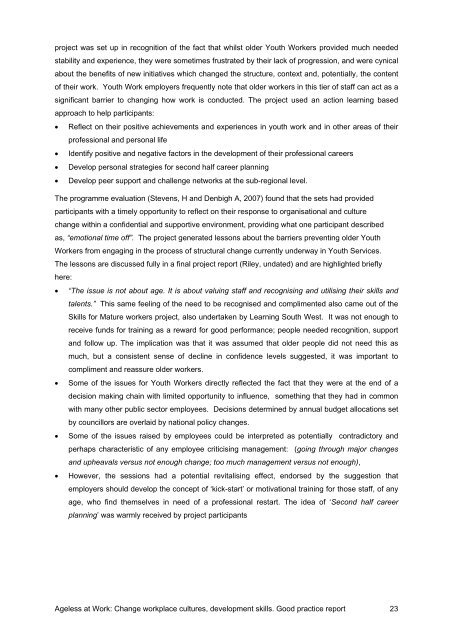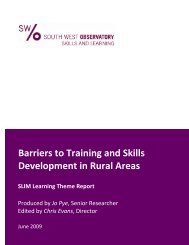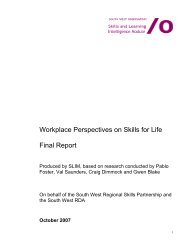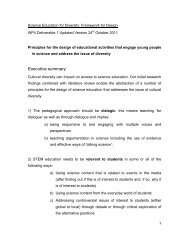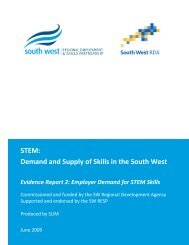Ageless at Work - Skills for Care
Ageless at Work - Skills for Care
Ageless at Work - Skills for Care
Create successful ePaper yourself
Turn your PDF publications into a flip-book with our unique Google optimized e-Paper software.
project was set up in recognition of the fact th<strong>at</strong> whilst older Youth <strong>Work</strong>ers provided much needed<br />
stability and experience, they were sometimes frustr<strong>at</strong>ed by their lack of progression, and were cynical<br />
about the benefits of new initi<strong>at</strong>ives which changed the structure, context and, potentially, the content<br />
of their work. Youth <strong>Work</strong> employers frequently note th<strong>at</strong> older workers in this tier of staff can act as a<br />
significant barrier to changing how work is conducted. The project used an action learning based<br />
approach to help participants:<br />
Reflect on their positive achievements and experiences in youth work and in other areas of their<br />
professional and personal life<br />
Identify positive and neg<strong>at</strong>ive factors in the development of their professional careers<br />
Develop personal str<strong>at</strong>egies <strong>for</strong> second half career planning<br />
Develop peer support and challenge networks <strong>at</strong> the sub-regional level.<br />
The programme evalu<strong>at</strong>ion (Stevens, H and Denbigh A, 2007) found th<strong>at</strong> the sets had provided<br />
participants with a timely opportunity to reflect on their response to organis<strong>at</strong>ional and culture<br />
change within a confidential and supportive environment, providing wh<strong>at</strong> one participant described<br />
as, “emotional time off”. The project gener<strong>at</strong>ed lessons about the barriers preventing older Youth<br />
<strong>Work</strong>ers from engaging in the process of structural change currently underway in Youth Services.<br />
The lessons are discussed fully in a final project report (Riley, und<strong>at</strong>ed) and are highlighted briefly<br />
here:<br />
“The issue is not about age. It is about valuing staff and recognising and utilising their skills and<br />
talents.” This same feeling of the need to be recognised and complimented also came out of the<br />
<strong>Skills</strong> <strong>for</strong> M<strong>at</strong>ure workers project, also undertaken by Learning South West. It was not enough to<br />
receive funds <strong>for</strong> training as a reward <strong>for</strong> good per<strong>for</strong>mance; people needed recognition, support<br />
and follow up. The implic<strong>at</strong>ion was th<strong>at</strong> it was assumed th<strong>at</strong> older people did not need this as<br />
much, but a consistent sense of decline in confidence levels suggested, it was important to<br />
compliment and reassure older workers.<br />
Some of the issues <strong>for</strong> Youth <strong>Work</strong>ers directly reflected the fact th<strong>at</strong> they were <strong>at</strong> the end of a<br />
decision making chain with limited opportunity to influence, something th<strong>at</strong> they had in common<br />
with many other public sector employees. Decisions determined by annual budget alloc<strong>at</strong>ions set<br />
by councillors are overlaid by n<strong>at</strong>ional policy changes.<br />
Some of the issues raised by employees could be interpreted as potentially contradictory and<br />
perhaps characteristic of any employee criticising management: (going through major changes<br />
and upheavals versus not enough change; too much management versus not enough),<br />
However, the sessions had a potential revitalising effect, endorsed by the suggestion th<strong>at</strong><br />
employers should develop the concept of ‘kick-start’ or motiv<strong>at</strong>ional training <strong>for</strong> those staff, of any<br />
age, who find themselves in need of a professional restart. The idea of ‘Second half career<br />
planning’ was warmly received by project participants<br />
<strong>Ageless</strong> <strong>at</strong> <strong>Work</strong>: Change workplace cultures, development skills. Good practice report 23


